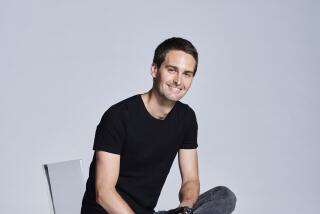The Download: Slack founder seems surprised by its runaway success
- Share via
Stewart Butterfield graduated high school to become part of the slacker generation, which is coincidentally reflected in the name of his business software start-up, Slack. His Twitter bio includes an apathetic “shruggie” emoticon and a mea culpa: “I’m trying my hardest!”
In other words, he’s not terribly concerned with creating the illusion of “crushing it” that so many other Silicon Valley entrepreneurs painstakingly project. Ironically, that might be the precise reason why Slack is such a media darling.
In interviews, Butterfield is honest, genuine, and rarely falls back onto pat talking points. He provides actual answers to questions, and he cracks dry jokes. He often seems just as surprised as anyone that Slack is such a runaway success.
Slack’s media appeal is boosted by the fact that the start-up is indeed crushing it.
Just two years in, and Slack has raised $340 million in venture capital, boosted its head count to 369 and snagged 2.3 million daily active users, 675,000 of which pay for the service.
Slack has $64 million in “annual recurring revenue,” a metric subscription software companies use to extrapolate monthly income for the entire year. The company has outgrown its office three times now, and will do so again in six months.
The growth was impressive enough to net Butterfield an “Innovator” award from WSJ Magazine in November. Accepting the award on stage in front of celebrities including Brad Pitt, Karlie Kloss and Robert DeNiro, Butterfield joked that he felt like he’d won the nerd award. When DeNiro took the stage, he made it clear he wasn’t amused by Butterfield’s comment, ending a mini-rant with, “I don’t give a … who you are.” Butterfield was amused. “I just literally got trash-talked by Robert DeNiro,” he tweeted, adding the hashtag #Lifegoals.
Then he shrugged.
Slack’s rapid adoption makes it one of the fastest-growing business software applications. (Some anecdotal evidence: Last year at two conferences for young creative types — one was held at a brewery in Brooklyn, for example — I asked the audience how many of them used Slack. Both times every hand in the crowd went up.)
The company, which launched two years ago and carries a $2.8-billion valuation, is also one of the world’s fastest-growing venture-backed start-ups.
Depending whom you ask, Slack is killing email, transforming business organizations and reimagining the document. Others argue Slack is destroying work-life balance and hurting productivity. In various glowing profiles, Slack’s software has been described as a “workplace revolution,” “taking over the world” and “a trojan horse.”
Butterfield does not intend to stop at killing email. (Which, actually, is a mischaracterization — Slack is killing emails within a company, but external emails will never go away. Even he still spends four hours a day emailing.)
To expand, Slack created an $80-million fund to invest in start-ups building tools for its application. It’s a way to outsource the building of customization and special new features. (Picture an App Store for Slack.)
So many developers have submitted their own Slack apps that the internal approval process has broken down, Butterfield says.
Slack also is opening an office in New York to focus on machine learning, artificial intelligence and bots that will create new capabilities for developers building things on Slack.
If there is one talking point Butterfield likes to lean on, it’s the one about empathy. He looks for empathy in every employee he hires, and he aims to build empathy into Slack’s software.
One example is Slack’s “do not disturb mode” feature, which has a default setting of holding messages sent during weekends and nights so workers can get a break from work notifications.
With 369 employees, Slack is the biggest organization Butterfield has run “by far,” he says. Before launching Slack, Butterfield co-founded Flickr, the popular photo-sharing site, selling it to Yahoo in 2005. He spent years toiling on a game called Glitch before abandoning it in 2012.
Expanding the business the right way is a challenge.
“It’s easy to hire too fast and have chaos and disorganization and insufficient management,” he says. “At the same time, we don’t want to drop opportunities on the floor.”
Already his team “feels like an insane number of people,” he says. “The guideline is the fewest people we can have without missing out on opportunities.”
Erin Griffith is a writer at Fortune.
Twitter: @eringriffith






